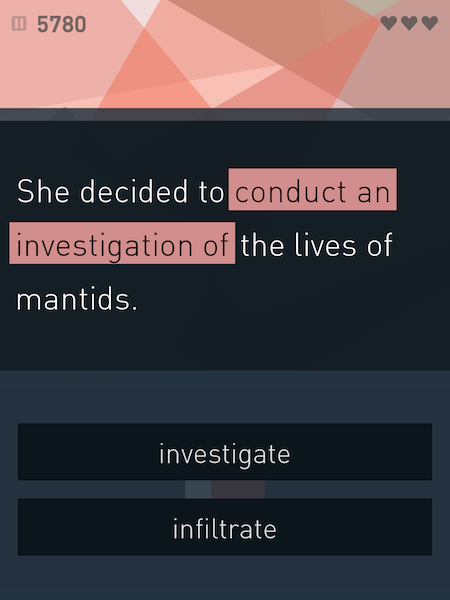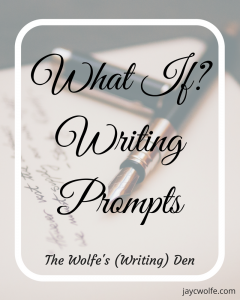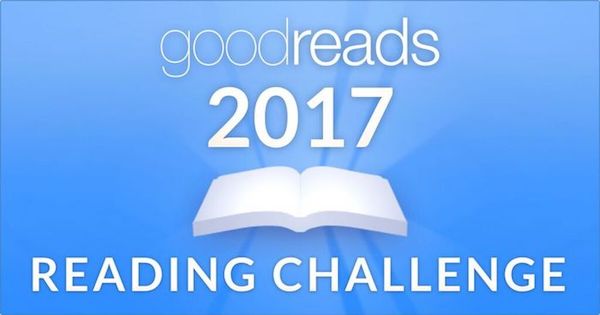by Naomi L. | July 26, 2017 | Blog, Creative Writing |
Remember that list I shared a while back of wordy phrases you should edit out of your writing? Well, there’s a lot more where those came from! The Clarity game in the Elevate – Brain Training app is full of long and passive phrases that can easily be reduced to single, clearer words. It never hurts to learn how to simplify as many as you can!
So for your reference, here are 16 more wordy phrases you should simplify when editing your writing. Enjoy!
 1) Able to: indicates that someone has the ability to do something. Simplify “able to” to “can”.
1) Able to: indicates that someone has the ability to do something. Simplify “able to” to “can”.
2) An adequate number of: a long phrase referring to an appropriate amount of something. Simplify “an adequate number of” to “enough”.
3) An appreciable number of: indicates a large amount of something. Simplify “an appreciable number of” to “several”.
4) An estimated: indicates an approximate number of something. Simplify “an estimated” to “about”.
5) By reason: refers to why something happened. Simplify “by reason” to “because”.
6) Conduct an investigation: passive form of the verb “investigate”. Simplify “conduct an investigation” to “investigate”.
7) Extend an invitation to: passive form of the verb “invite”. Simplify “extend an invitation to” to “invite”.
8) Have an adverse effect on: passive phrase meaning to produce an undesirable outcome. Simplify “have an adverse effect on” to “set back”.
9) In addition to: passive phrase indicating something extra. Simplify “in addition to” to “besides”.
10) In anticipation of: passive phrase referring to something done prior to an event. Simplify “in anticipation of” to “before”.
11) In connection with: a longer way to say concerning. Simplify “in connection with” to “about”.
12) It is crucial that you: a long phrase indicating something that is imperative. Simplify “it is crucial that you” to “you must”.
13) Made a statement that: lengthy phrase indicating that someone conveyed information. Simplify “made a statement that” to “said”.
14) Make reference to: passive phrase that indicates something being referenced. Simplify “make reference to” to “reference”.
15) Point of view: indicates how someone interprets a situation. Simplify “point of view” to “perspective”.
16) Realize a savings of: lengthy phrase that indicates an amount saved. Simplify “realize a savings of” to “save”.
Are you guilty of using any of these phrases? What other wordy phrases would you add to this list?
by Naomi L. | July 24, 2017 | Blog, Word of the Week |
Word: mulligan
Pronunciation: MƏ-li-ɡən
Part of Speech: noun
Definition: (in informal golf) an extra stroke allowed after a poor shot, not counted on the scorecard
Source: Oxford Dictionaries
Today I’m shaking things up in my Word of the Week segment with an informal word used in games. Though it’s most commonly associated with golf, I first learned this word while playing the mobile version of my favorite collectible card game: Pokémon TCG. One of the rules of the game states that each player must have a basic Pokémon in their starting hand; if you don’t, you must shuffle your cards back into your deck and redraw your hand until you do. This practice is part of the long-standing game tradition of the “do-over”, otherwise known as taking a “mulligan”!
A “mulligan” in any game is a second chance to perform an action, typically after the first attempt fails through a mistake or bad luck. In golf specifically, it refers to a free extra stroke allowed after a bad shot and which doesn’t count against the player’s score. The word arose in the early 20th century and comes from the surname Mulligan.
The exact origin of the word “mulligan” as a golf term is uncertain, but the conflicting stories all agree it was named after a golf player whose last name was Mulligan. Aside from its meaning in games, “mulligan” can also mean “a stew made from odds and ends of food”. Note that this word is chiefly informal and of North American usage, so it will likely work best in dialogue and colloquial writing. If your characters often take advantage of free second chances in games, “mulligan” may be a useful word for your stories!
What are your thoughts on this word? Any suggestions for future “Word of the Week” featured words?
by Naomi L. | July 19, 2017 | Blog, Creative Writing, What If? Writing Prompts |
So lately I’ve been playing around with Canva, and I’ve come up with a new image for my “What If?” Writing Prompts segment! To be honest, I’ve felt for a while that it was time for a change, so today I’m debuting this new “social media friendly” image with a fresh set of fantasy and science fiction prompts! See what new stories you can write based on these ideas, and feel free to add more of your own! Enjoy!
 What if… in the future, wars were waged entirely by artificial intelligence with no human input?
What if… in the future, wars were waged entirely by artificial intelligence with no human input?
What if… you died, only to wake up and discover you’d been living in a virtual reality all along?
What if… you switched bodies with an extraterrestrial and had to find a way to switch back before it could destroy your home?
What if… you spent so much time in virtual reality that you couldn’t tell the difference between the real world and the virtual world anymore?
What if… you brought home a mysterious rock you found… that turned out to be a dragon egg?
Good luck writing more stories in science fiction and fantasy!
If you have any “What If?” writing prompt suggestions (for any theme), please feel free to share them in the comments below. Ideas I like may be featured in future “What If?” posts, with full credit and a link to your blog (if you have one)! Also, if you’ve written a piece based on an idea you’ve found here, be sure to link back to the respective “What If?” post. I would love to see what you’ve done with the prompt! Thank you!
by Naomi L. | July 17, 2017 | Blog, Word of the Week |
Word: Lilliputian
Pronunciation: li-lə-PYOO-sh(ə)n
Part of Speech: adjective
Definition: trivial or very small
Source: Oxford Dictionaries
I shall personally see to it that the demented, drooling, slime-breathed little Lilliputian who owns this disgusting ribbon will never see the light of day again!
– Miss Trunchbull, Matilda (1996)
Continuing from last week’s theme of Gulliver’s Travels words, today’s Word of the Week entry features another adjective taken from Jonathan Swift’s most famous novel. In the above scene from the 1996 film Matilda, Miss Trunchbull has assembled Miss Honey’s class to accuse one of them of breaking into her house to terrorize her the night before. Her one clue to the culprit’s identity is the ribbon she found outside her house, and though she already knows it belongs to Matilda, she takes her time building up the fear in all the children with a particularly elaborate threat. Harsh as they are, at least one of her chosen words is accurate; compared to the towering Trunchbull, Matilda and her classmates are indeed “Lilliputian”!
Anything described as “Lilliputian” is very small or trivial. The word arose in the early 18th century and was created by Irish author Jonathan Swift for his novel Gulliver’s Travels. This word comes from the name of Swift’s fictional land Lilliput, which is populated by people six inches tall.
Though I first heard the word “Lilliputian” in Matilda years ago, I only recently learned what it means; until now, I assumed it was just another of the Trunchbull’s countless creative insults for children (it certainly sounds like one!). Like “Brobdingnagian”, “Lilliputian” also doubles as a noun (in this case, for a tiny person or thing) and should always be capitalized as it derives from a proper noun. If you write about trivial things or characters who are exceptionally small, “Lilliputian” may be a good word to consider for your stories!
What are your thoughts on this word? Any suggestions for future “Word of the Week” featured words?
by Naomi L. | July 12, 2017 | Blog, Creative Writing |
Yes, we’re already halfway through 2017! Amazing, isn’t it? Now that we’re in July, it’s once again time to assess our progress on our reading goals for the year. I’ll go first!
My 2017 Reading Goals
Like I did last year, I set a goal of ten books for the Goodreads 2017 Reading Challenge, a reasonable goal for a relatively slow reader like me. So far, I’ve met half my goal for the year! I’ve also noticed a trend of more books from my to-read list in January actually reaching my have-read collection, as well as more nonfiction books making the list (thanks in no small part to my pursuit of a freelancing career).

I plan to write a more detailed report on my 2017 reading goals at the end of the year. In the meantime, here’s a brief review of the books I’ve read so far, am currently reading, and still plan to read:
Books I’ve read so far
- The Hunger Games, by Suzanne Collins
- A Game of Thrones, by George R.R. Martin
- I Am Pusheen The Cat, by Claire Belton
- High Performance Paperback, by Ray Brehm and Jim Molinelli
- Fahrenheit 451, by Ray Bradbury
Books I’m currently reading
- 1984, by George Orwell
- Ready Player One, by Ernest Cline
- You Are A Writer, by Jeff Goins
- The Business of Writing & Editing, by Sagan Morrow
Books I still plan to read
- Wuthering Heights, by Emily Brontë
- Arrival, by Ted Chiang
- StarTalk, by Neil deGrasse Tyson
Your turn! Any reading goals you’re still working toward this year? Which ones have you completed so far?
by Naomi L. | July 10, 2017 | Blog, Word of the Week |
Word: Brobdingnagian
Pronunciation: brahb-ding-NA-ɡee-ən
Part of Speech: adjective
Definition: gigantic
Source: Oxford Dictionaries
Raj: You said I could buy a desk.
Sheldon: This isn’t a desk. This is a Brobdingnagian monstrosity.
Raj: Is that the American idiom for giant, big-ass desk?
– The Big Bang Theory (Season 4, Episode 4 – The Hot Troll Deviation)
If you’ve watched this episode of The Big Bang Theory, you probably visualized Raj’s comically huge desk while reading the above dialogue. During a workplace feud between Sheldon and Raj (who are working together), Raj decides to mess with Sheldon by buying himself a desk that takes up half their office. Sheldon then complains about its ridiculous size using an equally ridiculous word, and though it sounds unusual, it nonetheless captures the absurdity of the situation. Where all other adjectives fail, nothing says “comically gigantic” like “Brobdingnagian”!
Anything described as “Brobdingnagian” is gigantic in size. The word arose in the early 18th century and was invented by Irish author Jonathan Swift, who used it in his satirical novel Gulliver’s Travels. This word comes from the name of Swift’s fictional land Brobdingnag, which is occupied by giants.
Aside from its main use as an adjective, “Brobdingnagian” can also be used as a noun to refer to a giant person, as these were the colossal occupants of the aforementioned fictional land. Note that because it derives from a name, the word should always be capitalized. Its use is extremely rare (I’ve only ever heard it before on The Big Bang Theory), but it can certainly be used to humorous effect when describing something outstandingly enormous. If you write comedy full of giant people or things, “Brobdingnagian” may be an excellent word to use in your stories!
Sheldon: Help me move my desk.
[…]
Raj: No. It’s too Brobdingnagian.
What are your thoughts on this word? Any suggestions for future “Word of the Week” featured words?
 1) Able to: indicates that someone has the ability to do something. Simplify “able to” to “can”.
1) Able to: indicates that someone has the ability to do something. Simplify “able to” to “can”.
 What if… in the future, wars were waged entirely by artificial intelligence with no human input?
What if… in the future, wars were waged entirely by artificial intelligence with no human input?

Recent Comments